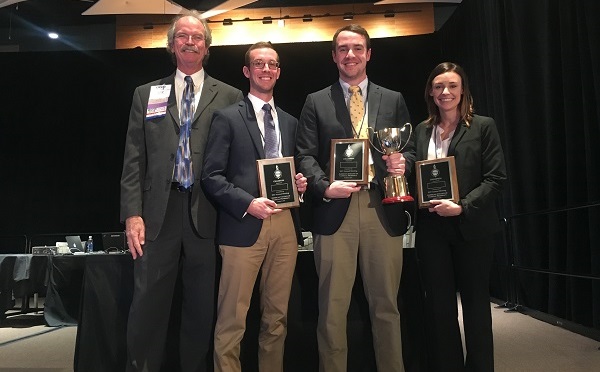
2017 ACCP Clinical Pharmacy Challenge Championship Team: University of Kentucky College of Pharmacy. Left to right: Dr. John Murphy (moderator), Drew Spargo, Zack Haffler, and Jordan Rice.
The three-member team from the University of Kentucky College of Pharmacy captured the 2017 ACCP Clinical Pharmacy Challenge title in an exciting back-and-forth match with the three-member team from the University of California San Francisco (UCSF) School of Pharmacy. From an initial field of 115 teams, these two institutions advanced through four online rounds of competition as well as live quarterfinal and semifinal matches to face each other in the final round held Monday, October 9, at the ACCP Annual Meeting in Phoenix.
The Clinical Pharmacy Challenge, now in its eighth year, affords teams of three pharmacy students to compete in a “quiz bowl”-type competition. Each round of competition is comprised of three segments: Trivia/Lightning, Clinical Case, and Jeopardy-style items. Items were written and reviewed by an expert panel of ACCP members.
A large and enthusiastic crowd of ACCP Annual Meeting attendees gathered to cheer on both teams in the final match. Representing Team Kentucky were Zack Haffler, Jordan Rice, and Drew Spargo. Team UCSF was represented by Maryam Havaei, Lisa Le, and Lisa Nelson. The two teams were virtually tied after the Trivia segment of the match; however, during the Clinical Case segment, UCSF pulled ahead of Team Kentucky with a convincing performance. The final section of the match was the Jeopardy-style round, during which teams were presented 15 items (3 items of 100, 200, and 300 points each) in each of the following categories: Asthma/COPD, Infectious Diseases, Endocrinology, Potpourri, and Women’s Health.
The teams employed strategic choices as they navigated the Jeopardy grid, selecting the item categories they felt would match their own unique strengths. Team UCSF maintained its lead early in the Jeopardy round, answering items in the Asthma/COPD and Endocrinology categories. Team Kentucky then began making a comeback, earning points in the Infectious Diseases and Women’s Health categories. With only the Potpourri category remaining, the gap between teams had narrowed, given that Kentucky had successfully answered the 100- and 200-point items and was now within striking distance for the win.
Less than 300 points now separated the teams, and the winner was determined by this final item of the competition:
A 58-year-old woman is admitted to the intensive care unit with respiratory failure secondary to pneumonia. Her oxygen requirements drastically increase over the next 6 hours, and a repeat chest x-ray shows worsening bilateral infiltrates. She is given a diagnosis of acute respiratory distress syndrome (ARDS). Early administration of which agent might decrease the patient’s risk of mortality? (explained answer follows the article)
- Activated protein C
- Aspirin
- Cisatracurium
- Rosuvastatin
Team Kentucky “buzzed in” and provided the correct answer, cisatracurium, earning 300 points and securing a dramatic win in a challenging match against a very strong UCSF team.
Please join ACCP in congratulating the teams from both universities on their outstanding academic achievement. To view a complete listing of teams who participated and progressed through each round of this year’s competition, please visit the student page of the ACCP website.